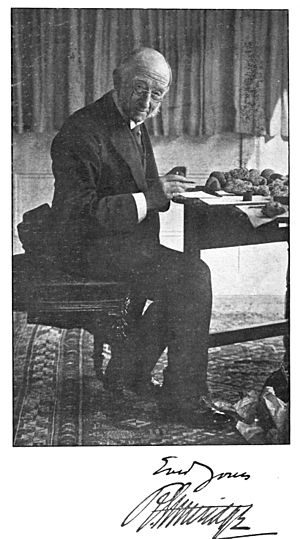Robert Etheridge facts for kids
Robert Etheridge was an English geologist and palaeontologist. Geologists study the Earth's rocks and history, while palaeontologists study fossils to learn about ancient life. Robert Etheridge was born on December 3, 1819, and passed away on December 18, 1903.
Contents
About Robert Etheridge
Robert Etheridge was born in a town called Ross-on-Wye in Herefordshire, England. After finishing school, he started working in a business in Bristol. But his real passion was natural history, which means studying nature and living things.
Early Life and Discoveries
In Bristol, Robert spent his free time learning about plants, animals, and rocks. He went to lectures at the Bristol Philosophical Institution. There, he met important scientists like William Sanders and Samuel Stutchbury. In 1850, he became the curator of the museum there. A curator is someone who takes care of a museum's collections. He also taught botany, the study of plants, at the Bristol medical school.
Working with Fossils
In 1857, Robert moved to London. He got a job at the Geological Museum, which is now part of the Natural History Museum. He later became the main palaeontologist for the Geological Survey. The Geological Survey maps the geology of a country.
For many years, Robert's main job was to identify and name the fossils found by the Geological Survey. He helped create a huge list of British fossils. He also wrote an important book called Fossils of the British Islands. This book helped scientists understand the different types of fossils found in Britain. He also helped update a well-known geology book called Manual of Geology.
Awards and Recognition
Robert Etheridge was a very respected scientist. In 1871, he became a Fellow of the Royal Society, which is a group of the most important scientists in the world. He also received the Murchison Medal in 1880, a special award for geologists. He was even the president of the Geological Society of London from 1881 to 1882.
Later, in 1881, he moved to the geological department of the British Museum. He worked there until 1891. In 1896, he was the first person to receive the Bolitho Medal from the Royal Geological Society of Cornwall.
Robert Etheridge died in Chelsea, London, and is buried in Brompton Cemetery. His son, Robert Etheridge, Junior, also became a palaeontologist, following in his father's footsteps.
 | Roy Wilkins |
 | John Lewis |
 | Linda Carol Brown |


